|
|
|
Sort Order |
|
|
|
Items / Page
|
|
|
|
|
|
|
| Srl | Item |
| 1 |
ID:
141472
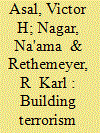

|
|
|
|
|
| Summary/Abstract |
In April 1984, 25 members of the Jewish Underground were arrested by the Israeli General Security Service moments after they had planted explosives in five Palestinian-owned buses. Their arrest and sentencing brought to an end one of the more sophisticated expressions of Jewish terrorism since the birth of Israel. Overall, the group planned four operations, one of which was the conspiracy to bomb the Muslim holy sites on the Temple Mount. As we outline below, social links between the members of the Jewish Underground significantly facilitated the creation of this organization. We demonstrate that social capital, here expressed in terms of networks, trust, and norms – which are widely considered important components of a healthy democracy – can take a negative turn toward participation in terrorism.
|
|
|
|
|
|
|
|
|
|
|
|
|
|
|
|
| 2 |
ID:
141475
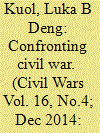

|
|
|
|
|
| Summary/Abstract |
Civil wars have become common and widespread, particularly in Africa. Civil war negatively affects rural livelihoods and contributes to increased vulnerability. Yet, there is limited understanding of how people survive in such circumstances. This article attempts to offer a nuanced understanding of the level of resilience and vulnerability during Sudan's civil war in the 1990s. The main thesis of this article is that households exposed to prolonged conflict undertake livelihood strategies that are effective under certain conditions and less effective in other settings. The households exposed to exogenous counter-insurgency warfare are found to be more resilient than those exposed to endogenous counter-insurgency warfare. Also, a negative relationship between wealth and vulnerability is found in the context of exogenous counter-insurgency warfare, while a positive relationship between wealth and vulnerability is observed in the context of endogenous counter-insurgency warfare, with the non-poor becoming more vulnerable than the poor. The findings of this paper may have some value for informing policy decisions and practical humanitarian approaches during civil war.
|
|
|
|
|
|
|
|
|
|
|
|
|
|
|
|
| 3 |
ID:
141473
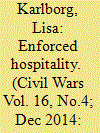

|
|
|
|
|
| Summary/Abstract |
While local mission legitimacy has prompted intense political and academic attention in the context of peace operations, our grasp of how host citizens understand the legitimacy of international troops remains limited. This article explores how Afghan citizens perceive the legitimacy of International Security Assistance Force (ISAF) troops. A qualitative analysis of in-depth interviews and focus group discussions with citizens in Kabul deepens our understanding of how ideational and security-related concerns interact and shape local perceptions of legitimacy through two oppositional discursive frames: a liberation frame and an occupation frame. The findings suggest that local mission legitimacy builds on the perceived will and capacity of ISAF troops to help and protect Afghans in ways that are in accordance with Afghan, most notably Islamic, ways of life. The article concludes that ISAF troops are widely perceived to have failed on both ideational and security-based grounds.
|
|
|
|
|
|
|
|
|
|
|
|
|
|
|
|
| 4 |
ID:
141471
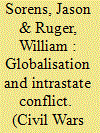

|
|
|
|
|
| Summary/Abstract |
How does globalisation, especially foreign direct investment, influence the risk of intrastate conflict? While several prominent studies have found that globalisation reduces the probability of civil war, we use new data and methods to approach the question. In particular, we test for the possibility that foreign investment is endogenous to conflict risk and appropriately use inward foreign investment stock rather than net inflow to measure an economy's exposure to international capital markets. We find no evidence that foreign investment affects civil conflict, suggesting that governments' fundamental security interests trump the economic losses they can expect to suffer from failing to compromise with potential rebel groups.
|
|
|
|
|
|
|
|
|
|
|
|
|
|
|
|
| 5 |
ID:
141474
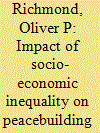

|
|
|
|
|
| Summary/Abstract |
Neoliberalism assumes that inequality creates productive competition and no risk of conflict where a viable state and social contract exists. From a critical position, inequality in a range of different forms (local to global in scale) weakens the links between civil society, solidarity, social justice, human rights and democracy. These positions have different implications for peace and order. State institutions are designed to make processes of consensual regulation permanent for the good of society. While continuing material inequality is inevitable, if the state and international community cannot mitigate its impact on security, rights and representation, in order to distribute a range of peace dividends, citizens rapidly begin to question the point of the state and undermine its legitimacy. Struggles over power, material resources and identity are thus untreated. This is especially problematic where the state also has been shaped through a peace agreement. Ironically, material inequality often lacking a Rawlsian justification of producing wider benefits of a peace dividend for society has been naturalised through peacebuilding and statebuilding, even though strong evidence suggests inequality is also at the root of many conflicts.
|
|
|
|
|
|
|
|
|
|
|
|
|
|
|
|
|
|
|
|
|